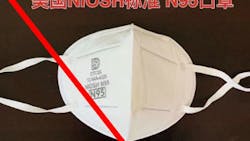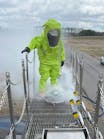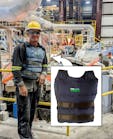Report: WV Firefighters Given Masks CDC Says Were Fake
By Joe Severino
Source The Charleston Gazette, W.Va.
Editor's note: Find Firehouse.com's complete coverage of the COVID-19 pandemic here.
West Virginia distributed 50,000 respirator masks to first responders, then left the devices in use after being advised they might be counterfeit.
After the Centers for Disease Control warned the state’s top public safety official about the problem and the manufacturer’s concern that its products were “being counterfeited,” he issued a 10-page report to first-responders asserting the masks are “authentic.”
“These masks are genuine products from Shanghai Dasheng Health Products Manufacture Co. Ltd. (Dasheng) and not counterfeit,” Jeff Sandy, secretary of the Department of Military Affairs and Public Safety, wrote in the April 16 memo.
The CDC advised Sandy that a model of the mask known as a DTC3X with ear loops was “being misrepresented as” approved by the National Institute of Occupational Safety and Health. Questions about the masks prompted the CDC to issue a cautionary notice on its website. Masks with ear loops frequently lack the fit needed to provide sufficient protection against pathogens, according to the health agencies.
Asked about the issue Monday, Sandy’s office provided an email sent to him April 13 by the chief of the NIOSH personal protective technology testing and evaluation lab in Morgantown that reiterated the CDC’s concerns.
“All NIOSH approvals manufactured by [Dasheng] have headbands, not ear loops,” John R. Powers Jr. wrote. “This is why NIOSH suspected this to be a counterfeit product. We have been in communication with [Dasheng] and they have informed us that their products are being counterfeited, and we are reaffirming that information on the Buyer Beware section of our Respirator Trusted-Source Information webpage.”
Sandy stood by the masks in his April 16 memo and in a response Monday to the Charleston Gazette-Mail.
“Secretary Sandy conducted research and concluded that these masks were made by the stated manufacturer and at its facility in China,” said public safety department spokesman Lawrence Messina wrote in an email Monday evening. “He notes that he conducted this research with a background as a career federal agent who had handled multiple international investigations.”
Messina said Sandy advised emergency officials during a morning call about the CDC’s warnings and said he agreed with them. Sandy also read from a ruling from the Food and Drug Administration stating the masks “are appropriate to protect the public health or safety.”
Some emergency officials and others in the first-responder community remained concerned despite Sandy’s assurances, according to emails obtained by the Gazette-Mail via a Freedom of Information Act request.
An expert whose guidelines are linked on the state fire marshal’s website also told county emergency officials in an email that the ear-loop masks “are definitely counterfeit masks, and they should not be used for front line emergency operations.”
West Virginia bought 100,000 respirators for $567,000, according to an invoice. Half the masks were DTC3X models with ear loops.
All masks approved by NIOSH and sold by Dasheng are made with headbands, which allow for a tighter fit and greater protection against COVID-19, the CDC lab wrote in an email.
“Ear loops are an automatic disqualifier,” said Christina Baxter, the CEO of Emergency Response Tips, a company that develops support tools and training solutions for emergency response, according to its website.
Baxter is chairwoman of the National Fire Protection Agency’s chemical protective clothing committee. The state fire marshal promotes information from the 124-year-old nonprofit on its website.
Urged by emergency officials to advise first-responders across the state about the concerns, Sandy — who was appointed by Gov. Jim Justice and reports to him — instead declared the masks were “not counterfeit.”
Some emergency management officials across the state said they are worried firefighters, paramedics, police and others on the front lines of the coronavirus fight are unaware of the risk.
“Most people don’t notice, including first responders, ear loops on N95s,” said West Virginia Fire Chief Association President Randy James. “Whatever PPE are given to [first responders], I want them to know the absolute limitations of that device ... I’m not the professional here ... I wouldn’t have known about ear loops or anything like that; somebody throws me a mask, I put it on.”
James emailed State Fire Marshal Ken Tyree on April 21, raising concerns about the respirators and urging that first responders be advised of the devices’ potential limitations.
“Randy, I’ll see what permission I’ll be given to proceed on this,” Tyree responded.
James said he never heard from Tyree.
The state fire marshal reports to the Military Affairs and Public Safety secretary.
In the same week Sandy authored the report to first responders, Illinois and Missouri recalled thousands of counterfeit masks purchased from China.
•••
The state purchased its respirators March 23, according to an invoice provided by Sandy’s office. His report traces the purchases from seven companies; from Ballard Safety Equipment in Martinsburg to Dasheng.
On April 10, an unnamed West Virginia fire chief claimed the state Division of Homeland Security and Emergency Management had sent several counterfeit masks to various counties, according to Sandy’s report.
On April 13, Braxton County Office of Emergency Services Director John Hoffman sent photos of the respirators to the CDC’s testing lab, according to emails.
“We suspect that these masks are either bogus or not true N95’s,” Hoffman wrote to the CDC.
The state distributed more than 50,000 of those respirators to first responders — 40,000 went to “city and county law enforcement, all firefighters, and county emergency management agencies;” 9,000 went to the West Virginia Division of Corrections and Rehabilitation and 1,600 to two unnamed hospitals.
The CDC lab said in an April 14 email to Hoffman that state Homeland Security officials reached out to the agency April 10 with the photos and questions about the masks. The lab provided Hoffman its response to the state, sent the day before, according to the emails.
The language matched that of Powers, the lab chief in Morgantown: “All NIOSH approvals manufactured by [Dasheng] have headbands, not ear loops. This is why NIOSH suspected this to be a counterfeit product.”
Respirators with ear loops failed what’s known as the Occupational Safety and Health Administration’s Quantitative Fit Test, the CDC lab wrote. That test calculates a respirator’s effectiveness while a person is using it, according to the CDC.
“The highest fit factor achieved was 11. The OSHA requirement is 100,” the CDC lab wrote.
When Hoffman emailed Sandy asking about these assertions and pointing out that Sandy had been sent them a day earlier, Sandy replied: “Are you going to share this communication?”
Hoffman then called on Sandy to relay the CDC’s information to all 55 counties’ emergency operations directors in his daily call. Sandy responded by clarifying he’d received the CDC email.
After Hoffman again turned to the CDC, another agency official responded citing problems with the DTC3X masks with ear loops.
“The photos of the DTC3X respirators sent by Jeff Sandy had ear loops and are being misrepresented as NIOSH-approved,” wrote Kim Gavel, deputy branch chief of the CDC/NIOSH National Personal Protective Technologies Lab in Pittsburgh.
Sandy asked whether KN95s, a less effective version of the N95, with ear loops would provide the same protection as NIOSH-approved masks, Gavel wrote. She said products claiming to be KN95s should filter 95% of particulates, like the N95s — but the limited samples of potentially counterfeit respirators the CDC received and tested did not meet that standard.
A former Department of Defense official, Baxter, the Emergency Response Tips CEO, also told Hoffman the respirators were bogus, according to the emails, which were dated the same day.
“First, these are definitely counterfeit masks and they should not be used for emergency front line emergency operations, especially for anyone dealing directly with a COVID-19 patient,” she wrote.
The respirators the state distributed are more comparable to surgical masks, Baxter wrote.
Justice’s office did not respond to requests for comment.
———
©2020 The Charleston Gazette (Charleston, W.Va.)
Visit The Charleston Gazette (Charleston, W.Va.) at www.wvgazette.com
Distributed by Tribune Content Agency, LLC.






